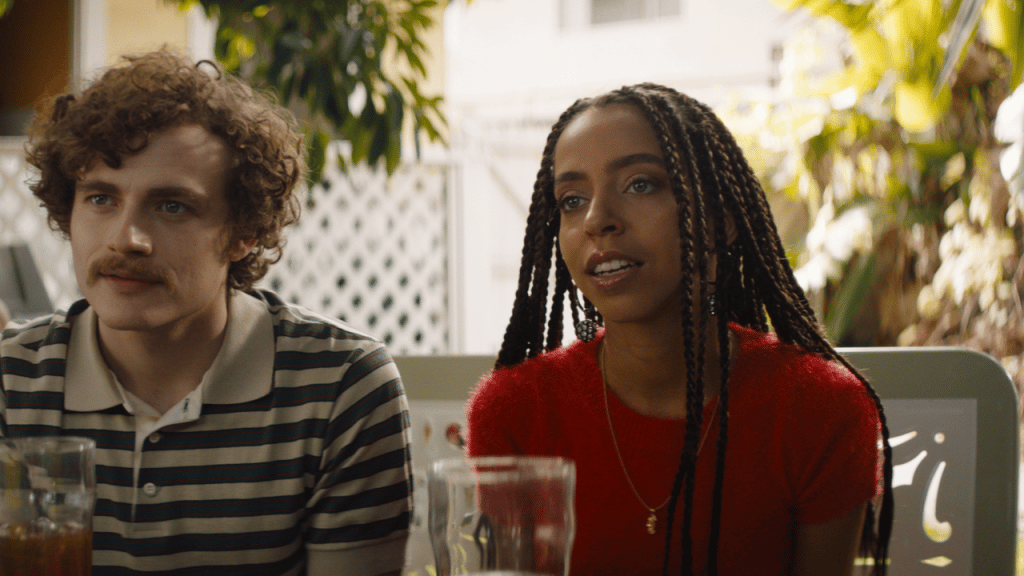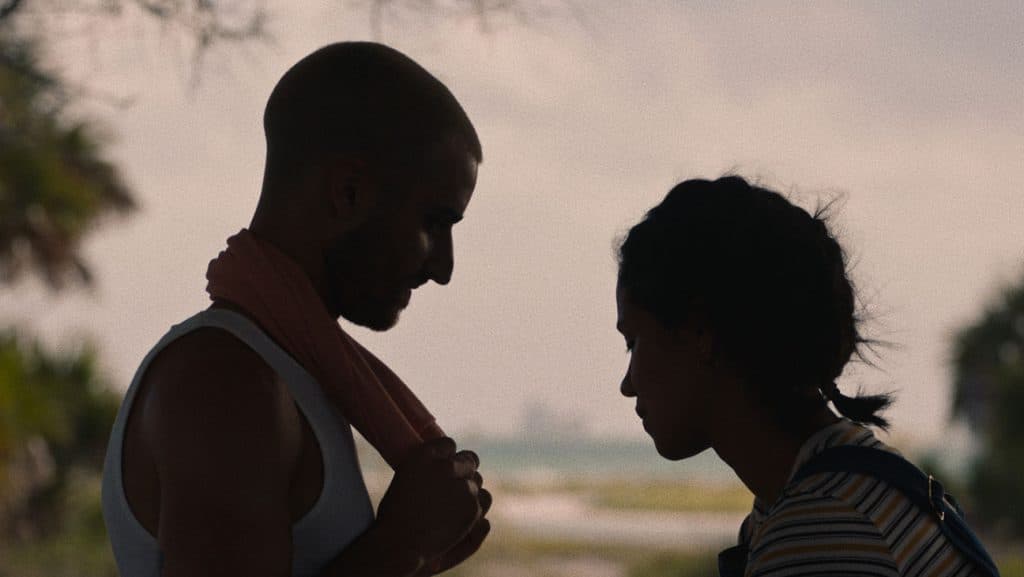Two indie romances act as unlikely companion pieces, in both good ways and bad, in this year’s Tribeca festival.
Mark, Mary & Some Other People and God’s Waiting Room don’t have a lot in common beyond the fact that they’re both tumultuous romances, of a sort, that happen to be playing in the U.S. Narrative Film at this year’s Tribeca Festival. Yet they feel, somehow, insistently compatible, in their later-stage failings moreso than their early-going successes.
They also both raise some provocative questions about indie cinema, albeit not necessarily ones that the filmmakers intended. Mark, Mary & Some Other People asks: has there ever been a good movie about a couple experimenting with an open relationship, swinging, or any other kind of multi-partner sexual situation? It’s been the basis for so many indie comedies that try to offer something transgressive before beating a hasty retreat back to traditionalism that portrays non-monogamy as a kind of hellish obstacle course, even as the characters try their best to articulate why monogamy is unnatural.
If anyone seemed capable of turning this material into something genuinely light and funny, it’s writer/director Hannah Marks, whose previous work includes starring and co-writing in the delightful teen sorta-romance Banana Split. At first, her talent for zippy banter and crisp visual compositions seems to be in full effect for this movie, giving her title characters a meet-cute that’s more of a refresher: Mark (Ben Rosenfield) recognizes Mary (Hayley Law) from a brief meeting; she initially blanks, but goes with it, and after montaging through the heady rush of a new relationship, they marry a year or so later.
Then, for reasons barely explained beyond a particularly unsatisfying bit of floor sex with her husband, Mary suggests giving non-monogamy a shot. The urgency already feels blunted because no truly convincing doldrums seem to have set in (aren’t there a few more Netflix series these people would binge before they raise the issue of ethical non-monogamy?). In what reads as an attempt at a role-reversal twist, Mark is hurt and apprehensive at the suggestion. It’s the first sign of how hard it is to get around the cliches of this conversation, whichever partner feels whichever way about it.

Mark eventually goes along with it, seemingly for spite—and both partners wind up enjoying themselves—at least for a time. And for a time, the movie generates some fizzy, unconventional romance, as the couple explores the logistics and the relationship benefits of sleeping around. Again, the whole thing moves capriciously fast; suddenly Mark and Mary are both ravenously consuming sexual partners at what seems like an exhausting rate. The sexual misadventures stave off a turn into melodrama, but also leave the movie unfocused. A long sequence where Mark and Mary try to figure out how to have a threesome is sort of cute and amusing (if indicative of the movie’s character limitations, where no one beyond the central couple and their designated besties has any personality). But what, really, is it saying about the whole non-monogamy plan? It feels like a different proposition all together.
For all that, the melodrama finds its way back to the movie anyway, and it’s the works: judgments, recriminations, a pregnancy scare, and more! It doesn’t help that Rosenfield has previously pitched his performance a bit broader than Law’s; he’s got a smaller reservoir of audience goodwill built up when the movie switches into relationship-mope mode. The feeling never dissipates that the characters are doing all of this on a whim; the filmmakers, too, feel like they’re just fucking around and seeing what happens, which makes the heavy stuff feel profoundly unearned.
God’s Waiting Room makes Mark, Mary & Some Other People seem like a lark by comparison, but it also swirls around an uncertain couple (it could be accurately retitled Rosie, Jules & Some Other People). Rosie (Nisalda Gonzalez) and Jules (Matthew Leone) also, like Mary and Mark, suffer from a charisma gap. Their haltingly blossoming relationship is a good-girl-meets-bad-boy cliché, but Gonzalez delivers a full performance, while Leone, playing a Latino-Italian New York-to-Florida transplant, is doing volatile-live-wire shtick. There’s a third main character who develops separate from this pair, and for a time it feels like maybe Brandon (Tyler Riggs, the movie’s writer-director), a young man trying to make his way back into society following a substantial prison stint, will form the third point on a love triangle.

The movie goes in another direction, however, which at first feels more disciplined and attentive to its characters, filling in the details of Brandon’s past and present rather than shoehorning him directly into Jules and Rosie’s world. The movie withholds Brandon’s connection to the rest of the story for so long, in fact, that once revealed, it holds all the arbitrariness of a bad plot twist despite its believability—especially when it’s followed by an abrupt turn into ruthlessly imposed fatalism. It’s a spectacular face-plant of an ending.
Before then, Riggs shows some promising if imitative talent behind the camera. God’s Waiting Room very much belongs to Terrence Malick school of post-millennial indies, with lots of handheld camera and dialogue that labors to sound fragmentary and overheard. It’s hard not to think of David Gordon Green, one of Malick’s most successful acolytes, because Green is so much better at integrating humor and character quirks.
Riggs has an eye for this stuff, capturing the beauty and desolation of the Tampa Bay area in equal measure, and God’s Waiting Room is most effective when it’s sinking into Rosie’s experience as a promising Latina songwriter with a single dad (Ray Benitez) who’s understanding to a point but has even less instinctive patience for Jules’ antics than most audience members. Like Mark, Mary & Some Other People, this is a movie that conveys the restlessness of youth so well, it’s constantly on the verge of wandering away from its best qualities, into forced confrontations.
Read next: The Spool's Best New Releases
Streaming guides
The Best Live TV Streaming Services With Free Trial
The praises of live TV streaming services don’t need to be further sung. By now, we all know that compared to clunky, commitment-heavy cable, live TV is cheaper and much easier to manage. But just in case you’re still on the fence about jumping over to the other side, or if you’re just unhappy with ... The Best Live TV Streaming Services With Free Trial
How to Watch Power Book III: Raising Kanan Season 3
Season 3 of the hotly anticipated Power spin-off, Power Book III: Raising Kanan, is arriving on Starz soon, so you know what that means: it’s the ’90s again in The Southside, and we’re back with the Thomas family as they navigate the ins and outs of the criminal underworld they’re helping build. Mekai Curtis is ... How to Watch Power Book III: Raising Kanan Season 3
How to Watch Doctor Who: 60th Anniversary Specials
Ladies and gentlemen, we’re so back! To celebrate Doctor Who’s 60th anniversary, the BBC is producing a three-episode special starring none other than the Tenth/Fourteenth Doctor himself, David Tennant. And to the supreme delight of fans (that would be me, dear reader), the Doctor will be joined by old-time companion Donna Noble (Catherine Tate) and ... How to Watch Doctor Who: 60th Anniversary Specials
Which Netflix Country has Interstellar?
Maybe you’ve just seen Oppenheimer and have the strongest urge to marathon—or more fun yet, rank!—all of Christopher Nolan’s films. Or maybe you’re one of the few who haven’t seen Interstellar yet. If you are, then you should change that immediately; the dystopian epic is one of Nolan’s best, and with that incredible twist in ... Which Netflix Country has Interstellar?
Which Netflix Country Has Each Movie of The Hunger Games?
For whatever reason, The Hunger Games series isn’t available in the same countries around the world. You’ll find the first and second (aka the best) installments in Hong Kong, for instance, but not the third and fourth. It’s a frustrating dilemma, especially if you don’t even have a single entry in your region, which is ... Which Netflix Country Has Each Movie of The Hunger Games?
How to Watch ESPN With A Free Trial
One of the major concerns people have before cutting the cord is potentially losing access to live sports. But the great thing about live TV streaming services is that you never lose that access. Minus the contracts and complications of cable, these streaming services connect you to a host of live channels, including ESPN. So ... How to Watch ESPN With A Free Trial
How to Watch Paramount Network With a Free Trial
To date, Paramount Network has only two original shows on air right now: Yellowstone and Bar Rescue. The network seems to have its hands full with on-demand streaming service Paramount+, which is constantly stacked with a fresh supply of new shows. But Yellowstone and Bar Rescue are so sturdy and expansive that the network doesn’t ... How to Watch Paramount Network With a Free Trial
How to Watch WE TV With a Free Trial
Previously “Women’s Entertainment,” We TV has since rebranded to accurately reflect its name and be a more inclusive lifestyle channel. It’s home to addictive reality gems like Bold and Bougie, Bridezillas, Marriage Boot Camp, and The Untold Stories of Hip Hop. And when it’s not airing original titles, it has on syndicated shows like 9-1-1, ... How to Watch WE TV With a Free Trial
How to Watch Comedy Central With a Free Trial
It’s no coincidence that many of today’s biggest comedians found their footing on Comedy Central: the channel is a bastion of emerging comic talents. It served as a playground for people like Nathan Fielder (Fielder For You), Ilana Glazer and Abbi Jacobson (Broad City), Tim Robinson (Detroiters), and Dave Chappelle (Chappelle’s Show) before they shot ... How to Watch Comedy Central With a Free Trial
How to Watch FX With a Free Trial
You’d be hard-pressed to find a bad show airing on FX. The channel has made a name for itself as a bastion of high-brow TV, along with HBO and AMC. It’s produced shows like Atlanta, Fargo, The Americans, Archer, and more recently, Shogun. But because it’s owned by Disney, it still airs several blockbusters in ... How to Watch FX With a Free Trial
How to Watch TNT Sports With A Free Trial
For many sports fans, TNT is a non-negotiable. It broadcasts NBA, MLB, NHL, college basketball, and All Elite Wrestling matches. And, as a bonus, it also has reruns of shows like Supernatural, Charmed, and NCIS, as well as films like The Avengers, Dune, and Justice League. But while TNT used to be a cable staple, ... How to Watch TNT Sports With A Free Trial